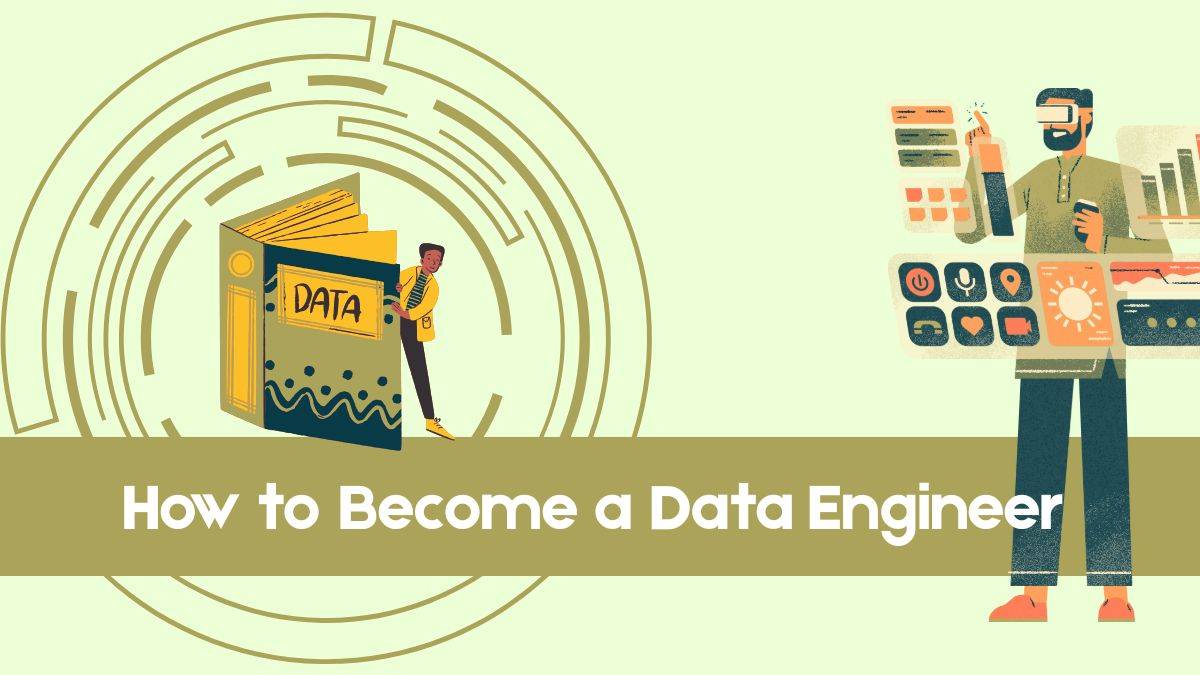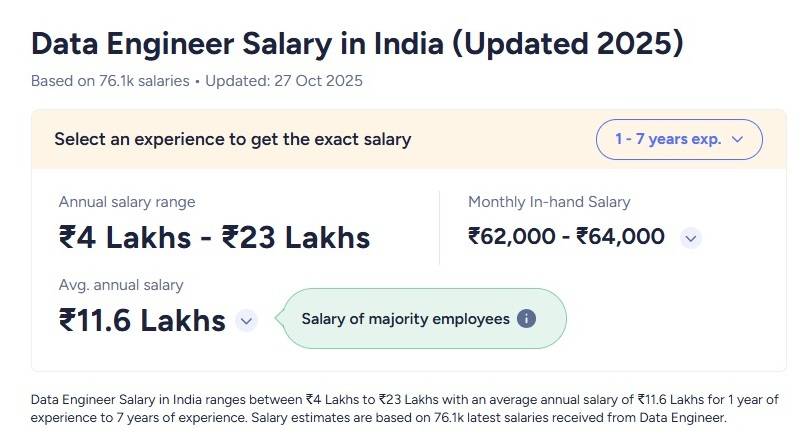How to Become a Data Engineer: Learn Top Skills of the In-Demand Career
In the last few years, data has grown exponentially. Because of this fact, businesses of all kinds and sizes recognize the need to tap into this valuable data in order to extract insights from it and make informed decisions. Data engineers play a major role in handling the process of data management, processing this ever-expanding pool of information. So, if you have been thinking of pursuing your career as a data engineer, then our blog is just for you; read ahead to learn how to become a data engineer.
According to a report published by AIM Research in January 2025, the world's leading Artificial Intelligence Industry Insights research firm and advisory council, the global data engineering market is expected to grow to US$175 billion by 2030, up from US$29.1 billion in 2023. This phenomenal growth is driven by the adoption of Artificial Intelligence, cloud computing, and big data. India will also benefit from government initiatives like Digital India and IndiaAI, thereby boosting demand for skilled data engineers.
- What is Data Engineer?
- Job Responsibilities of Data Engineers
- What Skills Should a Data Engineer Have?
- How to Become a Data Engineer?
- Data Engineer Career – Job Outlook
- Data Engineer Salaries
What is Data Engineer?
A data engineer is a professional who specialises in designing, developing, and implementing data systems and architectures. These professionals are responsible for building systems that collect, manage, and convert raw data into usable information. Their goal is to make data accessible and valuable so that data scientists and business analysts can interpret it and use it to make informed decisions.
Bigger organisations often hire data scientists or analysts to understand and manage the data. At the same time, smaller companies frequently rely on a single data engineer to handle both roles, making it a hotshot job profile.
Job Responsibilities of Data Engineers
The goal of Data Engineers is to build and maintain the data structures and technology architectures necessary for large-scale processing, ingestion, and deployment of data-intensive applications. They design and build the raw data repositories and, from there, collect, transform and prepare the data for analysis. After the models are ready, data scientists are responsible for deploying them to production.
As mentioned, data engineers are responsible for managing and organising data, while keeping an eye out for trends or issues that will affect business goals.
Some of the more common job responsibilities for a data engineer include:
- Develop, build, test, and maintain data structures and database pipeline architectures
- Acquire datasets that align with business needs
- Develop algorithms to convert data into actionable information
- Engage with cross-functional teams and business leaders to understand business goals and objectives
- Innovate new data validation methods and tools for data analysis
- Identify ways to improve data efficiency, quality, and reliability
- Conduct research for industry and business questions
- Use big data sets to address business problems
- Implement sophisticated analytics, machine learning, and statistical methods
- Prepare data for predictive and prescriptive models
- Find hidden patterns using data
- Use data to discover tasks that can be automated
- Deliver updates to stakeholders based on analytics
- Ensure compliance with data governance

What Skills Should a Data Engineer Have?
To become a data engineer, you should know how data is modelled and how SQL DBs work. Data engineers also program data intake and perform data cleaning, validation, quality checks, and aggregation. This is to ensure that the information reaches the data scientist correctly. Listed below are the top skills that you must develop to become a data engineer.
| Skill Name | Key Tools & Technologies |
| Basic Technical Skills | Python, R, Java, C++, MATLAB, Git/GitHub, Docker, Kubernetes |
| Cloud Computing |
|
| Data Security and Privacy | SSL/TLS, Firewalls, VPNs, Encryption, Identity and Access Management, GDPR Compliance Tools, OWASP ZAP |
| Schemes and Models | Linear and Logistic Regression, Decision Trees, Random Forest, SVM, Naive Bayes, K-Means, PCA, Neural Networks |
| Data Analysis | Excel, Power BI, Tableau, Python (Pandas, NumPy), R (dplyr, ggplot2), Jupyter Notebooks |
| Databases (PL/SQL or SQL) | Oracle Database, MySQL, PostgreSQL, Microsoft SQL Server, SQLite, MongoDB, Snowflake |
| Math & Statistics | Linear or logistic regression, decision trees, random forests, support vector machines (SVMs), factorization of non-negative matrices, K-means, etc. |
| Data Mining | RapidMiner, KNIME, Weka, Orange, SAS Enterprise Miner, Apache Spark (MLlib) |
| Distributed Storage Systems | Hadoop HDFS, Apache Cassandra, Apache HBase, Amazon S3, Google Bigtable, Snowflake |
| Machine Learning and Deep Learning | TensorFlow, Keras, PyTorch, Scikit-learn, XGBoost, LightGBM, OpenCV, Hugging Face |
| Visual and Verbal Communication | Tableau, Power BI, Google Data Studio, Canva, MS PowerPoint, Prezi, Google Slides |
How to Become a Data Engineer?
Below are the steps that you can follow to become a Data Engineer:
Fulfil the Educational Requirements
To become a data engineer, you must have a bachelor's degree in -
- Computer science
- Software or computer engineering
- Applied math/physics/statistics/equivalent
To gain real work experience, you should look for an internship or an entry-level position. You can also upskill yourself by taking up courses on data structures & algorithms, Python programming, database management, or coding.
Develop Your Technical Skills
Technical skills that you must develop and nurture over time to become a data engineer are -
- Hadoop/Hive
- Java
- Spark
- Kafka
- SQL and NoSQL
- Python
- Cloud platforms like AWS, GCP, Azure
- Data structures & Algorithms
- Distributed systems
- ElasticSearch
- Data storage and ETL tools
- Machine learning
- UNIX, Linux, and Solaris
Master Programming
You must understand that data engineers are at the intersection of software engineering and data science. So, before moving on to data engineering, you must go through software engineering.
The first steps then consist of gaining fundamental programming skills. The industry standard primarily revolves around cloud computing and basic programming languages such as Python, SQL, Scala, and Java.
Learn about Automation and Scripting
Data engineers must know how to automate tasks, as many of the functions you need to perform on your data can be tedious or require frequent execution.
If a task takes too long, automate it. You must learn to use tools like Apache Airflow to develop scripting skills and automate your data engineering workflows.
Understand your Databases
To be a data engineer, you must understand SQL. This is the established language, and it will not go away any time soon.
SQL is a beautiful, declarative language. It has several dialects, but you don't need to know them all as a data engineer. What is certain is that you must be familiar with PostgreSQL and MySQL.
On the other hand, you must also learn to model data in transactional databases (OLTP) and analytical databases (OLAP). And finally, you'll need to understand how unstructured data is dealt with in databases like MongoDB.
Master Data Processing Techniques
Once you have studied the fundamentals of data processing, the most challenging training comes from there. At this point, it's time to learn how to:
- Process big data in batches (use tools like Apache Spark or Hadoop).
- Process big data in streams (Apache Kafka or Apache Flink).
- Load the result into a destination database (MPP Databases).
The latter are databases that use parallel processing to perform analytical queries, and you must know them perfectly.
Schedule your workflows
Finally, schedule your render job regularly. You can keep it simple and use CRON or Apache Airflow to automate and orchestrate data engineering workflows.
Data Engineer Career – Job Outlook
Some of the popular job roles in this field are -
- Junior Data Engineer
- Mid-Level Data Engineer
- Data Architect
- Data Science Engineer
- Senior Data Engineer
- Data Engineering Manager
- Chief Data Officer
Data Engineer Salaries
AmbitionBox suggests that the average salary* of a data engineer in India is INR 11.6 LPA.
Here are the city-wise salaries of data engineers with an experience level of 1 - 2 years.
| City |
Average Salary |
Salary Range |
| Kolkata |
INR 10.1 LPA |
INR 3.8 - 15.5 LPA |
| Mumbai |
INR 10.4 LPA |
INR 3.8 - 19.2 LPA |
| Noida |
INR 10.4 LPA |
INR 4 - 18.8 LPA |
| Pune |
INR 10.6 LPA |
INR 3.9 - 20 LPA |
| New Delhi |
INR 10.6 LPA |
INR 4 - 21 LPA |
| Chennai |
INR 10.7 LPA |
INR 3.5 - 16.8 LPA |
| Hyderabad |
INR 11.2 LPA |
INR 4 - 19 LPA |
| Bangalore |
INR 11.6 LPA |
INR 4 - 22 LPA |
| Gurgaon |
INR 12.6 LPA |
INR 4.5 - 27 LPA |
| Aurangabad |
INR 6.3 LPA |
INR 1.8 - 9 LPA |
*Salaries as of October 2025.

 Call 8585951111
Call 8585951111

Rashmi Karan is a writer and editor with more than 15 years of exp., focusing on educational content. Her expertise is IT & Software domain. She also creates articles on trending tech like data science,